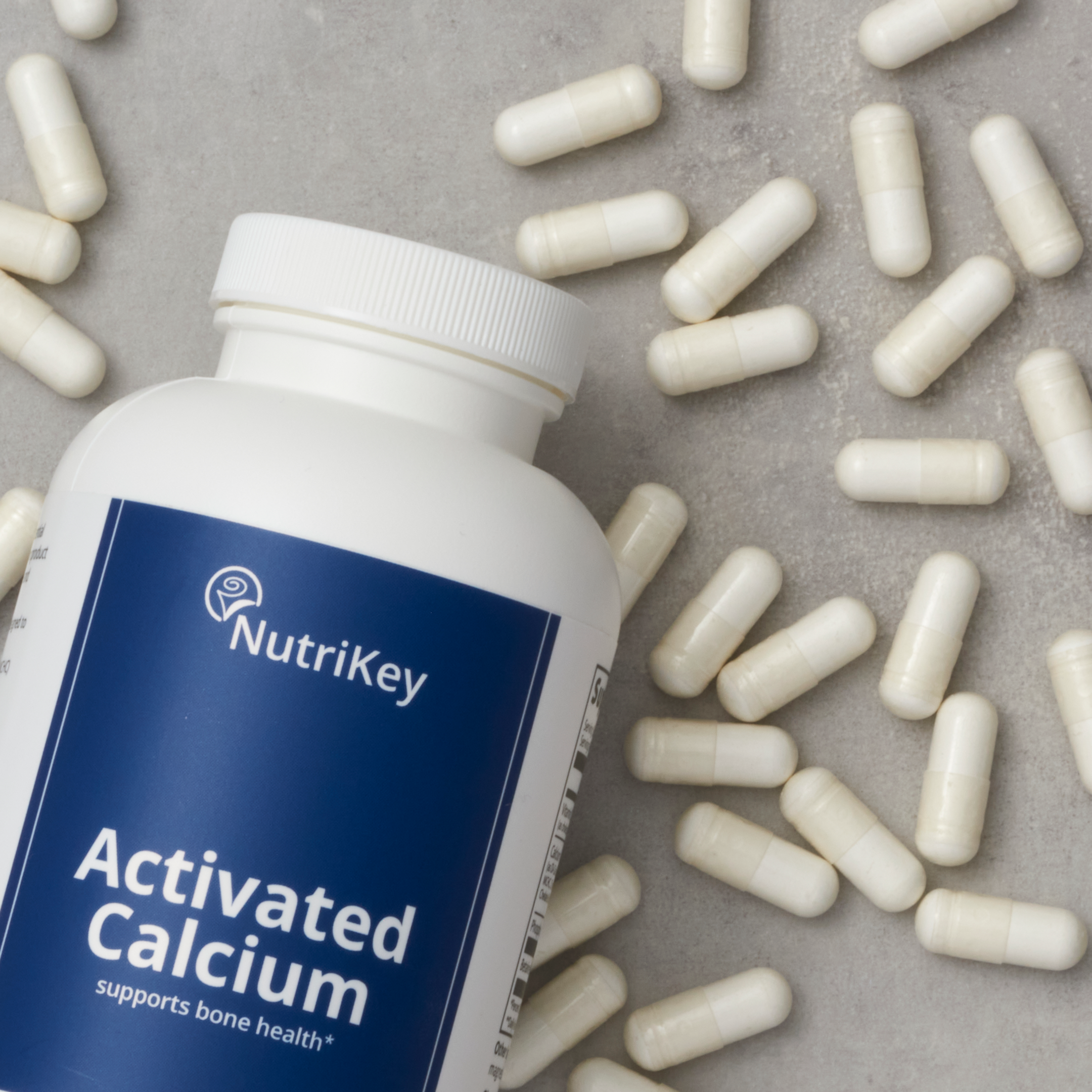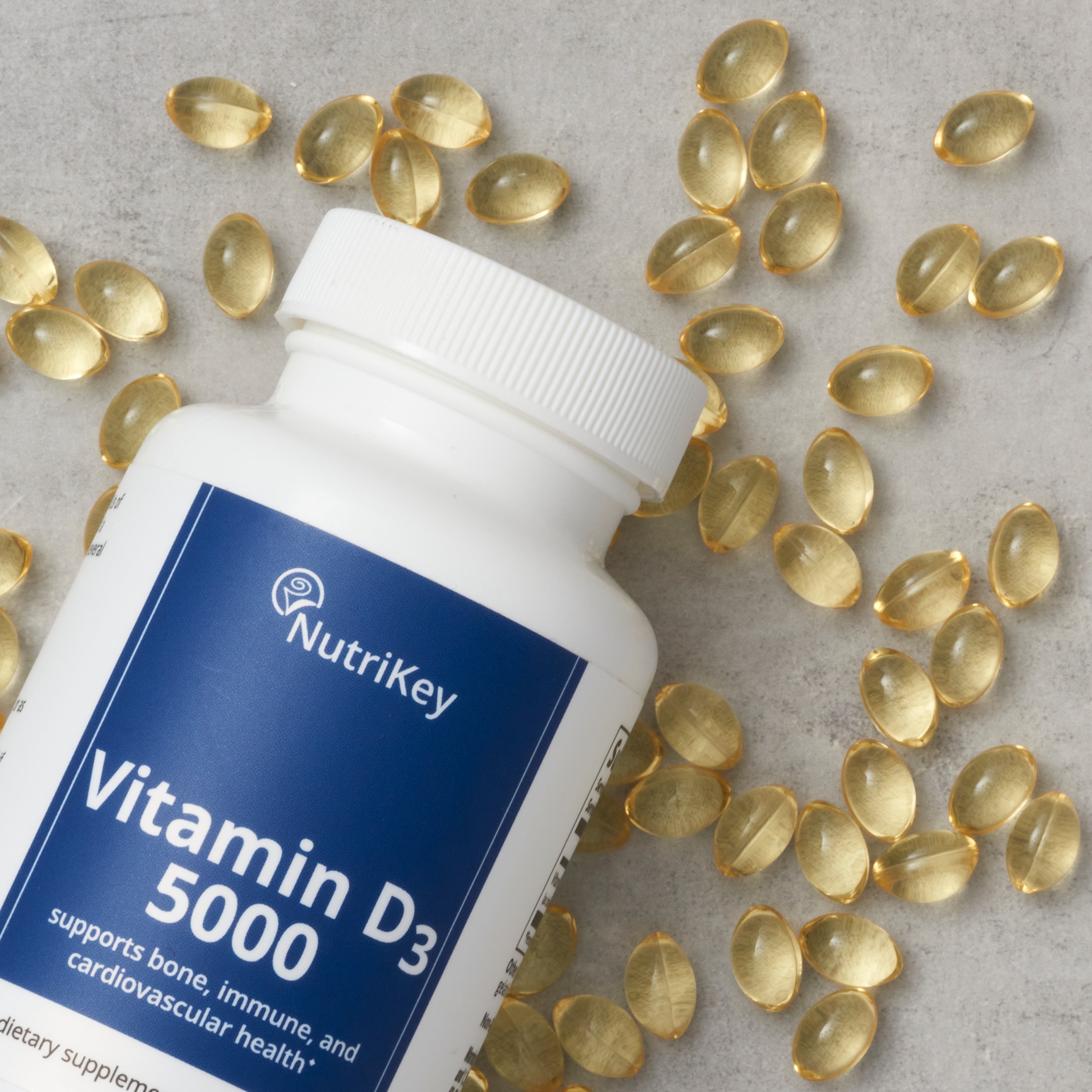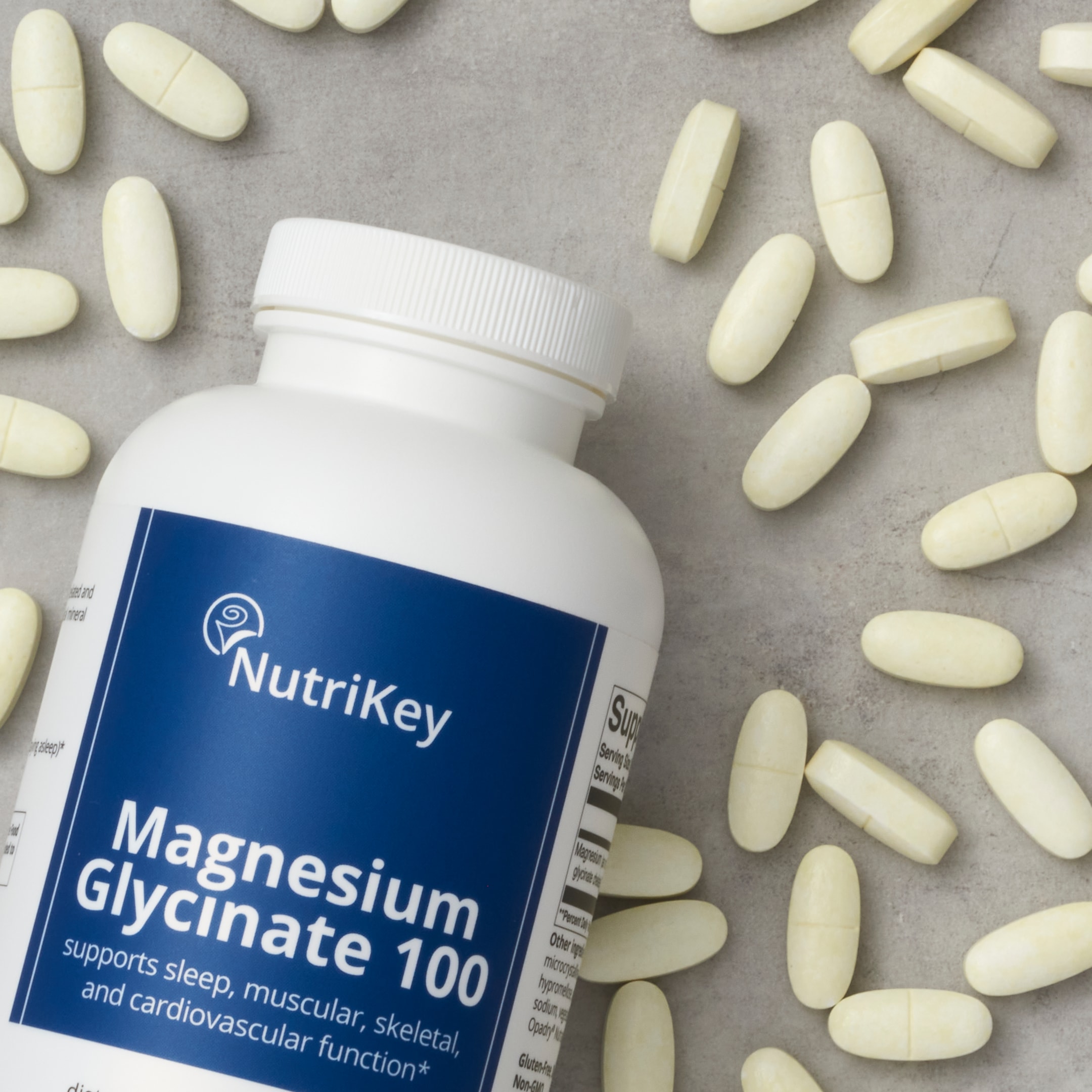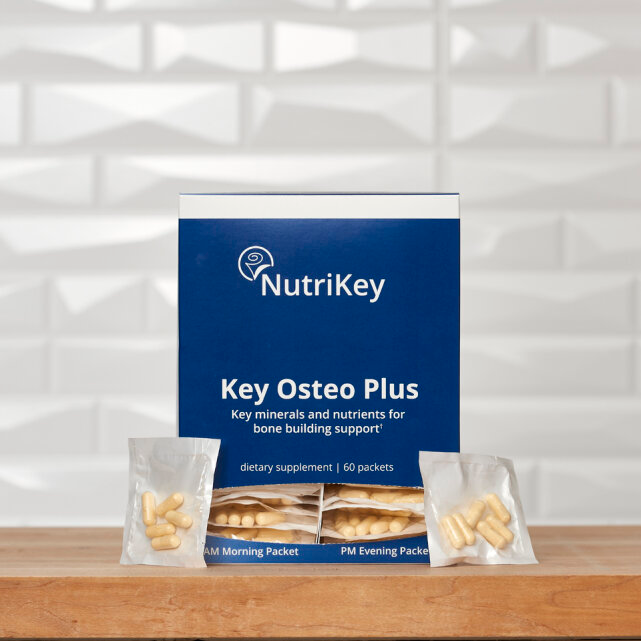
Top Osteoporosis & Bone Health Supplements
By Nutritional Weight and Wellness Staff
July 7, 2024
 Supplements That Help Osteoporosis
Supplements That Help Osteoporosis
Now that you have started to eat foods that support your bones and maybe even made the full menu for a day of bone-building foods, you may be asking yourself “What else can I do to keep my bones strong? How can I increase my bone density?”
At Nutritional Weight & Wellness we always say food first, but for that extra support, we can recommend a few quality dietary supplements that have helped our clients.
Table of Contents:
Do You Need Extra Bone Support?
First, who could benefit most from having a nutrition and supplement plan to keep their bones strong?
-
Were you just diagnosed with osteopenia or osteoporosis?
-
Or perhaps these diseases run in your family giving you an increased risk of developing them yourself?
-
Have you been on prescription medications that put your bones at risk?
-
Maybe you have struggled with disordered eating?
If any of these criteria sound familiar, your bones could use extra attention to treat osteoporosis, for osteoporosis prevention, or to continue supporting healthy bones.
What Supplements Keep Bones Healthy?
As you get your protein and fat from real foods to help the process of remodeling and increasing bone density, you’ll want to focus on getting those key minerals and vitamins, like calcium and vitamin K and D3 that support bone health.
Food contains all these important nutrients, but if you already have osteoporosis or osteopenia and want to start rebuilding and strengthening your bones, we highly recommend adding bone-building supplements into your real food plan as well.
Let’s walk through a few of your options:

Calcium Supplements
Before we dig into calcium supplements, we want to mention calcium is just a small component of bone. We'll mention this mineral first because it's the one everyone thinks of first when it comes to bone health, but nutrition for osteoporosis is so much more than calcium!
Most people understand that they need calcium to support strong bones and teeth, which is great, but please know that not all calcium supplements are created equal.
We would encourage you to look at the form of calcium before you buy a product. If you are investing money in a product and putting in the effort of taking calcium supplements, you want it to work!
Which calcium to avoid:
Here's how to check: flip the bottle over and if it says “calcium carbonate” or “coral calcium” on the ingredient label, it is time for an upgrade.
Calcium carbonate is a cheap form of supplemental calcium, which is poorly absorbed and doesn't get incorporated into your bones. Calcium carbonate is the most available form of calcium that you'll find in big box stores.
Which calcium to look for:
Instead, look for a high quality product that's labeled calcium citrate, calcium malate, and calcium glycinate on the ingredient label.
These are better forms and can be used for bone material.
Taking several different kinds of calcium helps with absorption since they have different binding sites. The body distributes the calcium across several sites rather than overtaxing one absorption site and this will ensure you're getting adequate calcium intake.
This doesn't mean you have to buy different types of calcium supplements: all three of these forms can be found in NutriKey Activated Calcium.
Calcium as hydroxyapatite (sometimes shows as MCHC on the label – microcrystalline hydroxyapatite calcium) is newer to the market and is the direct material that your bones are made of (calcium/phosphorous blend), so your body has to do less work to incorporate this into your bone structure.
This type of calcium is available in NutriKey Key Osteo Plus and NutriKey Activated Cal-Mag.
Research shows that the best absorbed forms of calcium are microcrystalline hydroxyapatite complex (MCHC) and the chelated forms.
Think of it this way: chelated just means that a small piece of protein, called an amino acid, is attached to the mineral calcium to help it be absorbed.
Vitamin D3
One more thing to look for is vitamin D3 on the label of your calcium supplement, because research shows that vitamin D works to shuttle calcium into the bones.
We'll get into the specifics of this below.
How To Take Calcium Supplements
If you’re concerned about bone health, we recommend taking three capsules of Activated Calcium daily.
It’s best to take it at night with magnesium, which helps with the absorption of calcium in your body.
If you want to combine your magnesium and calcium together, Activated Cal-Mag is an option and contains an added dose of vitamin D3 to help with bone mineral density.
For those who don’t enjoy swallowing tablets or capsules, we also have an Activated Calcium Chewable in a chocolate flavor that feels like a special treat for your bones, teeth, and overall health!
Considerations When Taking Calcium Supplements
There are a few things to consider when thinking about supplementing with calcium: how much you're getting and what form you're taking.
Getting too much calcium and especially taking a poorly absorbed form of calcium can be harmful.
Generally, people don't need to take more than a thousand milligrams of calcium a day, and many experts say to not exceed more than 2,000 milligrams total of dietary calcium and supplemental calcium.
Researchers suspect that the increase of calcium in the blood can occur after too much supplementation, taking a cheap form of calcium, or the inability to metabolize calcium.
This may actually facilitate the calcification of arteries, which is the plaque buildup in our arteries.
It’s also suspected that the extra calcium above one's requirements is not absorbed by the bones, but then is excreted through the urine, which can increase the risk of calcium-based kidney stones.
An important piece to the puzzle of intestinal calcium absorption and making sure you're body is utilizing the calcium supplements is whether you are getting enough vitamin D to metabolize the calcium you're taking.
Let's dig into this one next.
Vitamin D Supplements

Most people associate adequate vitamin D with boosted moods (among other amazing impacts), but did you know it's also a hormone that has been shown to increase the absorption of calcium from the gastrointestinal tract?
Basically, when you have optimal levels of vitamin D you are able to absorb the calcium you take in through food and supplements.
Vitamin D3, also known as cholecalciferol, is recommended over vitamin D2 because it is easier for the body to process and utilize the D3 form.
As we age, we have fewer vitamin D3 receptors, which is crucial because vitamin D3 acts like a key to open the receptors for calcium absorption into the bones.
So, when we have fewer receptors, we absorb less calcium and don't get all the benefit from our calcium intake.
In his book The Vitamin D Solution, Dr. Michael Holik recommends 4000-5000 IU of vitamin D3 daily to prevent chronic diseases like osteoporosis.
How To Take A Vitamin D Supplement
We recommend having your vitamin D levels checked to know your individual dosing needs and to make sure you don't have a vitamin D deficiency.
The optimal blood level is 50-80 ng/mL.
While some people need to supplement with 1,000 IUs, others require higher doses like 5,000 IUs.
A general winter dose to start is 5,000 IUs per day if you live in a northern climate with less sun exposure. (Easy to take because it comes in one 5,000 IU small softgel that is so small it's a cinch to swallow.)
For southern climates (or summer for us northern folks), use a supplement of 3,000 IUs per day year round. (For this level, use three of the 1,000 level softgels.)
For children, or anyone who doesn't want to swallow a supplement, you can take a liquid vitamin D supplement and tailor your dose by drops.
Vitamin K
Vitamin K2 helps disperse the calcium we absorb and sends it to the bones.
Vitamin K2 can be found in dark leafy green veggies or taken as a supplement.
Because vitamin D and vitamin K have a synergistic relationship with each other, NutriKey has a Vitamin D3 With K2 to make it easy for you.
How To Take Vitamin K2 Supplements
If you're on a blood thinner, talk with your medical professional before starting vitamin K.
If you are taking the Vitamin D3 with K2 included, follow the instructions to get the right amount of vitamin D that you need.
Magnesium Supplements

Another beneficial mineral for our bones and teeth is magnesium.
Perhaps you have used magnesium to get a better night of sleep or to reduce foot cramps, but this mineral is also crucial for bone health.
Research shows that in the United States, three out of four adults are deficient in magnesium.
Almost half of the magnesium in our bodies is actually found in our bones, so it is crucial that we include it as part of our bone-building plan. Similarly to vitamin D, magnesium also works to increase the absorption of calcium.
We recommend magnesium glycinate or citrate since they are the best absorbed forms of the mineral.
We do not recommend magnesium oxide, the cheap form found in many big box store products.
How To Take Magnesium Supplements
If you are dealing with digestive issues like constipation, we recommend going with magnesium citrate as that form will help pull water into the bowels.
If your bowel movements are regular, we recommend sticking with magnesium glycinate.
We recommend taking 200-800 mg per day, especially if you are having trouble sleeping.
Which Magnesium Supplement to choose:
Magnesium Glycinate 100 (tablet form) and Magnesium Glycinate 75 (capsule form) are great for all of the symptoms mentioned above.
If you’re having trouble with constipation, Magnesium Citrate helps draw moisture into the intestines to help aid bowl movements.
If you need support with all of the above (sleep, relaxation, constipation, etc!), Mixed Magnesium contains both forms and will be your best friend.
Your nutritionist can help you determine the amount and the type that’s right for your symptoms.
Comprehensive Supplement Support: Key Osteo Plus

For those looking at a more comprehensive and aggressive supplement for bone health, we would encourage you to consider Key Osteo Plus.
Not only was it designed with calcium, magnesium, and vitamin D, but it also has additional minerals to support the integrity and strength of bones. Some notable minerals include strontium and boron.
For many clients, it replaces their daily multivitamin too because of the robust range of nutrients in it!
"I think this product is really great for clients to feel like it takes all the guesswork and nutrition noise out of their head." -Melanie Beasley RD, LD
Key Osteo Plus is designed to be split into a morning and evening regimen. The morning packet and evening packet encompass the full spectrum of nutrients to maintain strong bones.
We find that many clients enjoy the ease of having the packets to keep their bone health support plan simple and doable.
Alongside a well-balanced healthy diet, Key Osteo Plus has been used successfully for those with osteopenia or even osteoporosis who want to improve their bone density.
Key Osteo Plus is a good option because it’s a calcium supplement but also includes the minerals and other nutrients needed for bone formation, so you don’t have to buy them all separately and figure out the doses.
We’ve done that research for you, and even separated it into convenient AM and PM packets so you are getting the right nutrients at the right time of day.
For Extra Bone Health Support

If you read our article on Foods For Osteoporosis, you might remember the different layers of the bones.
The inner meshy layer of bone is made up of collagen and fat.
Just like with the minerals, you can supplement with collagen to help create that important inner layer.
Key Collagen is a high quality collagen product that includes a peptide called Fortibone, which will go directly into your bones so your body doesn’t have to synthesize it.
For the ultimate bone support combo, we recommend pairing Key Osteo Plus to support the hard exterior bone layer and Key Collagen to support the meshy inner layer.
Support Your Bone Mineral Density With Key Nutrients
Bone health is so much more complex than just taking calcium supplements! Overwhelmed and not sure what dietary supplements would be best for you?
Let our nutrition counselors help you put together a personalized approach to get your bones back in good health!
We offer in-person or virtual consultations, whatever works best for you, and often health insurance will cover nutrition consultations, so check with your provider.
Online Class: Preventing Osteoporosis With Bone Building Foods
Learn which foods build bones and understand the factors that put your bones at risk.
Preventing Osteoporosis With Bone Building Foods
For more information on the supplements osteoporosis could benefit from, check out these resources:
LISTEN: All About Calcium - Ask a Nutritionist - What calcium supplement should I take? Do I get enough calcium from my diet? Calcium is just for our bones, right? How much calcium should I take? Britni goes over all you need to know about calcium supplementation.
READ: What To Look For In A Collagen Powder- a comprehensive guide to choosing the best collagen powder and how it may help with bone density concerns.
READ: How Much Vitamin D Do You Get From The Summer Sun?- what causes vitamin D deficiency, how much you can get from the sun, and why you might vitamin D in supplement form to help absorb calcium among other benefits!









Charlene webb
I have ostroprosis in spine neck and hip area now. I take50,000 unit vit d3 1 weekley citracal slow released 650 i was taking 2 but im taking 1 because im on some insure drinks right now i was taking two but what do i need to take and how much magiumn and what kind along with this plz get bk plus ive been on actonal but had stop due to sickness going try start tomarrow once momtly been real sick
June 30, 2022 at 12:50 pm
admin
Key Osteo is what we recommend for osteoporosis, it’s a comprehensive supplement designed for bone health. Click here to watch a video that tells you more about it. Bone health isn’t just about supplements, diet plays an integral role. Ensure isn’t something we would recommend including into your diet, because it’s highly processed and has undesirable ingredients. I would highly recommend making an appointment with one of our nutritionists so you can get more individualized recommendations to improve your bone density.
Rick
New studies have shown that vitamin K2 mk7 plays a vital role in bone health. Combined with magnesium and vitD3.
April 26, 2023 at 8:38 am
admin
Yes, we agree that k2 is important for bone health.
When you are going to supplement with vitamin D, we would recommend purchasing one that also contains vitamin K2 or taking that separately as a standalone supplement. If you're deficient in any of these vitamins, minerals, calcium is not providing the benefit that you hope it is.